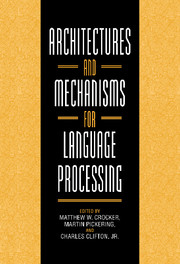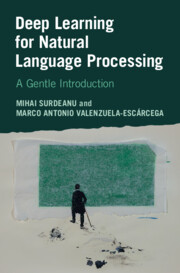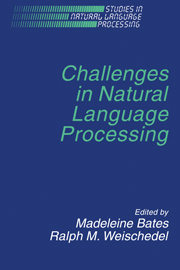Architectures and Mechanisms for Language Processing
The architectures and mechanisms underlying language processing form one important part of the general structure of cognition. This book, written by leading experts in the field, brings together linguistic, psychological, and computational perspectives on some of the fundamental issues. Several general introductory chapters offer overviews on important psycholinguistic research frameworks and highlight both shared assumptions and controversial issues. Subsequent chapters explore syntactic and lexical mechanisms, the interaction of syntax and semantics in language understanding, and the implications for cognitive architecture.
- Recognized authorities in the field as contributors
- Fast-moving field of interest both to academics and to applied researchers (machine language applications)
- Book is designed to appeal across disciplines (linguistics, psychology, cognitive sciences, computer science)
Reviews & endorsements
"This book represents the state of the art in sentence processing, with interesting examples and opportunities for computational modeling." Computational Linguistics
Product details
November 1999Hardback
9780521631211
376 pages
229 × 152 × 25 mm
0.72kg
60 b/w illus. 13 tables
Available
Table of Contents
- Contributors
- Preface
- 1. Architectures and mechanisms in sentence comprehension Martin J. Pickering, Charles Clifton, Jr., and Matthew W. Crocker
- Part I. Frameworks:
- 2. Evaluating models of human sentence processing Charles Clifton, Jr
- 3. Specifying architectures for language processing: process, control, and memory in parsing and interpretation Richard L. Lewis
- 4. Modeling thematic and discourse context effects with a multiple constraints approach: implications for the architecture of the language comprehension system Michael K. Tanenhaus, Michael J. Spivey-Knowlton, and Joy E. Hanna
- 5. Late closure in context: some consequences for parsimony Gerry T. M. Altmann
- Part II. Syntactic and Lexical Mechanisms:
- 6. The modular statistical hypothesis: exploring lexical category ambiguity Steffan Corley and Matthew W. Crocker
- 7. Lexical syntax and parsing architecture Paola Merlo and Suzanne Stevenson
- 8. Constituency, context, and connectionism in syntactic parsing James Henderson
- Part III. Syntax and Semantics:
- 9. On the electrophysiology of language comprehension: implications for the human language system Colin Brown and Peter Hagoort
- 10. Parsing and incremental understanding during reading Martin J. Pickering and Matthew J. Traxler
- 11. Syntactic attachment and anaphor resolution: the two sides of relative clause attachment Barbara Hemforth, Lars Konieczny, and Christoph Scheepers
- 12. Cross-linguistic psycholinguistics Marica De Vincenzi
- Part IV. Interpretation:
- 13. On interpretation: minimal 'lowering' Lyn Frazier
- 14. Focus effects associated with negative quantifiers Linda M. Moxey and Anthony J. Sanford
- 15. Constraints and mechanisms in theories of anaphor processing Amit Almor
- Author index
- Subject index.




